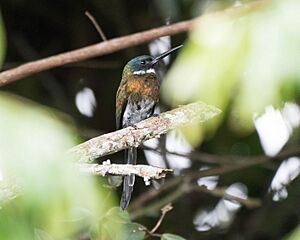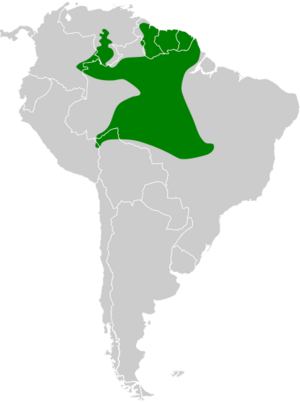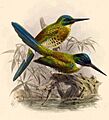Bronzy jacamar facts for kids
Quick facts for kids Bronzy jacamar |
|
|---|---|
 |
|
| Conservation status | |
| Scientific classification |
|
| Kingdom: | Animalia |
| Phylum: | Chordata |
| Class: | Aves |
| Order: | Piciformes |
| Family: | Galbulidae |
| Genus: | Galbula |
| Species: |
G. leucogastra
|
| Binomial name | |
| Galbula leucogastra Vieillot, 1817
|
|
 |
|
| Script error: The function "autoWithCaption" does not exist. | |
Script error: No such module "Check for conflicting parameters".
The bronzy jacamar (scientific name: Galbula leucogastra) is a beautiful bird that belongs to the Galbulidae family. These birds live in parts of South America, including countries like Bolivia, Brazil, Colombia, French Guiana, Guyana, Suriname, and Venezuela.
Contents
About the Bronzy Jacamar
The bronzy jacamar is a unique bird. It is the only type of bronzy jacamar. It is very similar to the purplish jacamar (Galbula chalcothorax). Scientists used to think they were the same species. Now, they are considered a "superspecies," meaning they are a group of very similar birds.
Some birds in eastern Brazil were thought to be a different kind of bronzy jacamar, but this was not accepted. Also, the bronzy jacamar might have mixed with the green-tailed jacamar (G. galbula) in Suriname. This is called hybridization.
What Does the Bronzy Jacamar Look Like?
The bronzy jacamar is about 19 to 22 centimeters (7.5 to 8.7 inches) long. It weighs about 15 to 18 grams (0.5 to 0.6 ounces). That's about as much as a few quarters!
- Males: Their head and face are a dark, shiny greenish-blue. The rest of their upper body and chest are a shiny bronzy-green. Sometimes, they have a slight purple shine. They have a black chin and a white throat and belly. The belly often looks speckled with black.
- Females: Their face is dark gray. Their throat and belly are a pale yellow or buff color.
Where Do Bronzy Jacamars Live?
Bronzy jacamars are found in many places. They live in southern Venezuela, eastern Colombia, much of west-central Brazil, northern Bolivia, and southeastern Peru. There have also been reports of them in southern Colombia and Ecuador.
These birds live in many different types of places. They like the edges and clearings of both old and new forests. They can be found in forests that flood sometimes, and in areas with white sand. They also live in wooded savannas and marshes with small groups of trees. You can often find them near streams and rivers in lowlands. They can live up to 900 meters (2,950 feet) high. In Brazil, they also live in dry forests and open areas with light plants.
How Do Bronzy Jacamars Behave?
What Do They Eat?
Bronzy jacamars eat many different kinds of flying insects. They might eat fewer butterflies and dragonflies than other similar birds. They usually sit on open branches by themselves or in small groups. They often perch between 2 and 10 meters (7 to 33 feet) high. When they see an insect, they fly out quickly to catch it. Sometimes, they join groups of different bird species that are looking for food together.
How Do They Raise Their Young?
Scientists have found three bronzy jacamar nests. Two nests were inside termite nests in trees. The third nest was in a plant called a bromeliad that grew on a tree trunk. At one nest in a termite home, both the mother and father fed the baby bird. At the bromeliad nest, only the female fed the young birds.
What Do They Sound Like?
The bronzy jacamar seems to have two main songs. One song sounds like whistling notes that get higher and faster, ending with a trill [1]. The other song is described as "weeee, weep-pip-pweeeeee, weep-pip-pweeeeee, weep-pip-pweeeeee" [2]. They also have a call [3].
Are Bronzy Jacamars in Danger?
The IUCN (International Union for Conservation of Nature) has said that the bronzy jacamar is a species of "Least Concern." This means that it is not currently in danger of disappearing. However, it is not very common in most places where it lives. It might be affected by losing its habitat due to human activities.
Images for kids
 | James Van Der Zee |
 | Alma Thomas |
 | Ellis Wilson |
 | Margaret Taylor-Burroughs |



